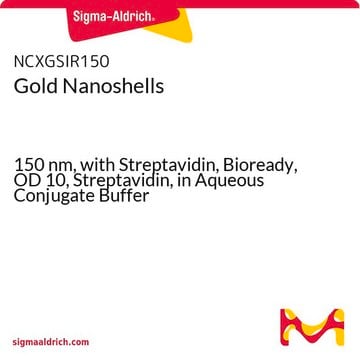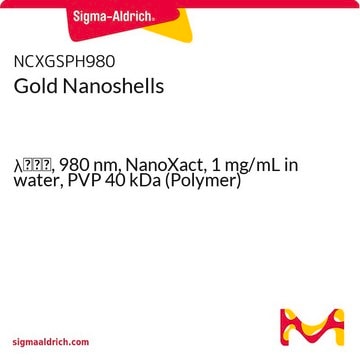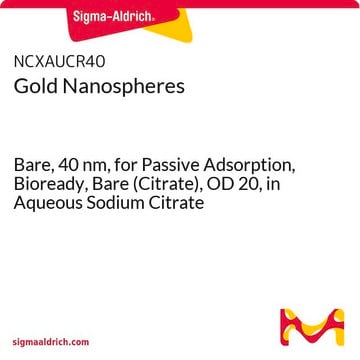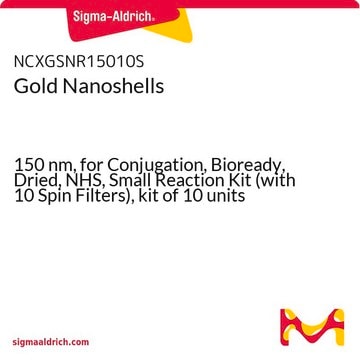NCXGSXR150
Gold Nanoshells
150 nm, for Covalent Conjugation, Bioready, OD 20, Carboxyl, inaqueous 0.02 mM potassium carbonate
Anmeldenzur Ansicht organisationsspezifischer und vertraglich vereinbarter Preise
Alle Fotos(1)
About This Item
UNSPSC-Code:
12162002
NACRES:
NA.23
Empfohlene Produkte
Form
nanoshells
OD
20
Partikelgröße
150 nm
Suchen Sie nach ähnlichen Produkten? Aufrufen Leitfaden zum Produktvergleich
Anwendung
Gold nanoshells (150 nm, for covalent conjugation, Bioready, carboxyl, OD 20, in water) can be potentially used in a variety of applications such as label-free biosensors, magnetic nanoparticles based bioassay, localized surface plasmon resonance (LSPR), and plasmon biosensors.
Owing to their plasmonic properties nanoparticles of gold and silver find broad range of applications extending from diagnostics to molecular detection, photothermal and microwave-based therapies, and nanotoxicology. Colloidal silver nanoparticles also find applications in antimicrobial coatings, electronics and photovoltaics, and surface enhanced Raman spectroscopy (SERS) whereas the colloidal gold nanoparticles find applications in lateral flow assays (immunochromatographic assays) and as TEM labels and size standards.
Our BioReady materials are engineered for reliable conjugation to antibodies, proteins, peptides, and other biomolecules and are ideal for lateral flow (immunochromatographic assays) and other diagnostics related applications.
The BioReady spherical gold nanoshells are made up of silica core and gold shell and are available with carboxyl, NHS, and streptavidin surface functional groups. These novel gold nanoshells are well suited for lateral flow assay applications. The gold nanoshells show strong absorbance and exhibit greater per-particle signal and, compared to the conventional 40 nm gold nanoparticles, these could enhance the assay sensitivity by 20 fold. Gold surface in these nanoshells is promising as the substitution of gold nanoshells in existing gold nanoparticles-based assays should be easy. The gold nanoshells offer a high contrast blue/gray stripe line (compared to red or pink stripe from 40 nm gold).
Gold nanoshells with carboxyl surface can be used for robust covalent conjugation. This allows for greater stability, sensitivity, reproducibility, and control over particle antibody loading (often requires less antibody compared to passive adsorption). Our covalently-bound streptavidin conjugated gold nanoshells allow easy binding with biotin.
The BioReady conjugation kits contain dried gold nanoshells with NHS-activated carboxyl surface. With pre-functionalized nanoshells with EDC/NHS surface, these are well suited for rapid antibody screening.
The small reaction NHS kits contain 50 μL of 20 OD gold in each unit whereas the large reaction kits contain 500 μL of 20 OD gold in each unit.
Our BioReady materials are engineered for reliable conjugation to antibodies, proteins, peptides, and other biomolecules and are ideal for lateral flow (immunochromatographic assays) and other diagnostics related applications.
The BioReady spherical gold nanoshells are made up of silica core and gold shell and are available with carboxyl, NHS, and streptavidin surface functional groups. These novel gold nanoshells are well suited for lateral flow assay applications. The gold nanoshells show strong absorbance and exhibit greater per-particle signal and, compared to the conventional 40 nm gold nanoparticles, these could enhance the assay sensitivity by 20 fold. Gold surface in these nanoshells is promising as the substitution of gold nanoshells in existing gold nanoparticles-based assays should be easy. The gold nanoshells offer a high contrast blue/gray stripe line (compared to red or pink stripe from 40 nm gold).
Gold nanoshells with carboxyl surface can be used for robust covalent conjugation. This allows for greater stability, sensitivity, reproducibility, and control over particle antibody loading (often requires less antibody compared to passive adsorption). Our covalently-bound streptavidin conjugated gold nanoshells allow easy binding with biotin.
The BioReady conjugation kits contain dried gold nanoshells with NHS-activated carboxyl surface. With pre-functionalized nanoshells with EDC/NHS surface, these are well suited for rapid antibody screening.
The small reaction NHS kits contain 50 μL of 20 OD gold in each unit whereas the large reaction kits contain 500 μL of 20 OD gold in each unit.
Lagerung und Haltbarkeit
DO NOT FREEZE. Store at 2-8C when not in use to maximize shelf life. Nanomaterials can be sensitive to high and low pH conditions and high salt concentrations. Use caution when changing environmental conditions as particles may aggregate.
Rechtliche Hinweise
Product of nanoComposix, Inc.
Lagerklassenschlüssel
12 - Non Combustible Liquids
WGK
WGK 1
Flammpunkt (°F)
Not applicable
Flammpunkt (°C)
Not applicable
Hier finden Sie alle aktuellen Versionen:
Analysenzertifikate (COA)
Lot/Batch Number
Leider sind derzeit keine COAs für dieses Produkt online verfügbar.
Wenn Sie Hilfe benötigen, wenden Sie sich bitte an Kundensupport
Besitzen Sie dieses Produkt bereits?
In der Dokumentenbibliothek finden Sie die Dokumentation zu den Produkten, die Sie kürzlich erworben haben.
Plasmonic biosensors and nanoprobes based on gold nanoshells
Xu B, et al.
Chinese Science Bulletin, 56(31), 3234-3234 (2011)
Theoretical investigation of size, shape, and aspect ratio effect on the LSPR sensitivity of hollow-gold nanoshells
Shabaninezhad M and Ramakrishna G
J. Chem. Phys. , 150(14), 144116-144116 (2019)
A label-free biosensor based on gold nanoshell monolayers for monitoring biomolecular interactions in diluted whole blood
Wang Y, et al.
Biosensors And Bioelectronics, 23(7), 1166-1170 (2008)
Hongrong Jiang et al.
Journal of biomedical nanotechnology, 9(4), 674-684 (2013-04-30)
In present study, we put forward an approach to prepare three-layer core-shell Fe3O4@SiO2@Au magnetic nanocomposites via the combination of self-assembling, seed-mediated growing and multi-step chemical reduction. The Fe3O4@SiO2@Au magnetic nanocomposites were analyzed and characterized by transmission electron microscope (TEM), scanning
Unser Team von Wissenschaftlern verfügt über Erfahrung in allen Forschungsbereichen einschließlich Life Science, Materialwissenschaften, chemischer Synthese, Chromatographie, Analytik und vielen mehr..
Setzen Sie sich mit dem technischen Dienst in Verbindung.





